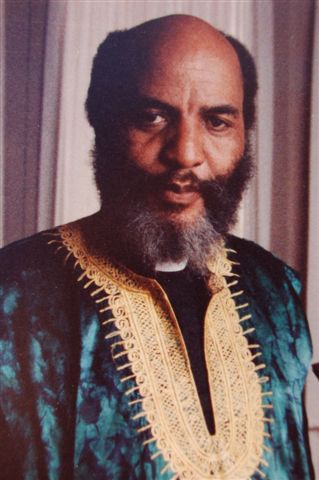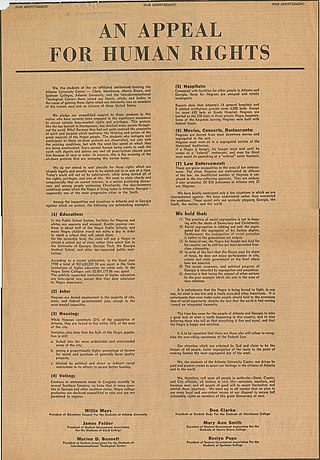Related Research Articles

The civil rights movement was a social movement and campaign from 1954 to 1968 in the United States to abolish legalized racial segregation, discrimination, and disenfranchisement in the country. The movement had its origins in the Reconstruction era during the late 19th century and had its modern roots in the 1940s, although the movement made its largest legislative gains in the 1960s after years of direct actions and grassroots protests. The social movement's major nonviolent resistance and civil disobedience campaigns eventually secured new protections in federal law for the civil rights of all Americans.
Desegregation is the process of ending the separation of two groups, usually referring to races. Desegregation is typically measured by the index of dissimilarity, allowing researchers to determine whether desegregation efforts are having impact on the settlement patterns of various groups. This is most commonly used in reference to the United States. Desegregation was long a focus of the American civil rights movement, both before and after the US Supreme Court's decision in Brown v. Board of Education, particularly desegregation of the school systems and the military. Racial integration of society was a closely related goal.

Ella Josephine Baker was an African-American civil rights and human rights activist. She was a largely behind-the-scenes organizer whose career spanned more than five decades. In New York City and the South, she worked alongside some of the most noted civil rights leaders of the 20th century, including W. E. B. Du Bois, Thurgood Marshall, A. Philip Randolph, and Martin Luther King Jr. She also mentored many emerging activists, such as Diane Nash, Stokely Carmichael, and Bob Moses, as leaders in the Student Nonviolent Coordinating Committee (SNCC).

Samuel Ernest Vandiver Jr. was an American Democratic Party politician who was the 73rd governor of Georgia from 1959 to 1963.

The Greensboro sit-ins were a series of nonviolent protests in February to July 1960, primarily in the Woolworth store—now the International Civil Rights Center and Museum—in Greensboro, North Carolina, which led to the F. W. Woolworth Company department store chain removing its policy of racial segregation in the Southern United States. While not the first sit-in of the civil rights movement, the Greensboro sit-ins were an instrumental action, and also the best-known sit-ins of the civil rights movement. They are considered a catalyst to the subsequent sit-in movement, in which 70,000 people participated. This sit-in was a contributing factor in the formation of the Student Nonviolent Coordinating Committee (SNCC).

The Nashville sit-ins, which lasted from February 13 to May 10, 1960, were part of a protest to end racial segregation at lunch counters in downtown Nashville, Tennessee. The sit-in campaign, coordinated by the Nashville Student Movement and the Nashville Christian Leadership Council, was notable for its early success and its emphasis on disciplined nonviolence. It was part of a broader sit-in movement that spread across the southern United States in the wake of the Greensboro sit-ins in North Carolina.

James Luther Bevel was an American minister and leader of the 1960s Civil Rights Movement in the United States. As a member of the Southern Christian Leadership Conference (SCLC), and then as its Director of Direct Action and Nonviolent Education, Bevel initiated, strategized, and developed SCLC's three major successes of the era: the 1963 Birmingham Children's Crusade, the 1965 Selma voting rights movement, and the 1966 Chicago open housing movement. He suggested that SCLC call for and join a March on Washington in 1963 and strategized the 1965 Selma to Montgomery marches which contributed to Congressional passage of the 1965 Voting Rights Act.
The Albany Movement was a desegregation and voters' rights coalition formed in Albany, Georgia, in November 1961. This movement was founded by local black leaders and ministers, as well as members of the Student Nonviolent Coordinating Committee (SNCC) and the National Association for the Advancement of Colored People (NAACP). The groups were assisted by Martin Luther King Jr. and the Southern Christian Leadership Conference (SCLC). It was meant to draw attention to the brutally enforced racial segregation practices in Southwest Georgia. However, many leaders in SNCC were fundamentally opposed to King and the SCLC's involvement. They felt that a more democratic approach aimed at long-term solutions was preferable for the area other than King's tendency towards short-term, authoritatively-run organizing.
The Atlanta Student Movement was formed in February 1960 in Atlanta by students of the campuses Atlanta University Center (AUC). It was led by the Committee on the Appeal for Human Rights (COAHR) and was part of the Civil Rights Movement.

An Appeal for Human Rights is a civil rights manifesto initially printed as an advertisement in Atlanta newspapers on March 9, 1960 that called for ending racial inequality in Atlanta, Georgia, United States. The manifesto was written by students of Atlanta's six historically black colleges and universities that comprise the Atlanta University Center. It was drafted by Roslyn Pope and other students of the Atlanta University Center after the students, led by Lonnie King and Julian Bond, were encouraged by the six presidents of the Atlanta University Center to draft a document stating their goals. The students, organized as the Committee on Appeal for Human Rights (COAHR), published An Appeal for Human Rights working within and as part of the Civil Rights Movement.
Lonnie C. King Jr. was an American civil rights leader. Beginning in 1960, he launched the Atlanta Student Movement, wrote the Appeal for Human Rights, and subsequently started the Committee on Appeal for Human Rights. His work led to the desegregation of Atlanta and continued advocacy has brought further education to America regarding present-day racism and the struggles of the civil rights movement.
Joseph Everhart Boone was an American civil rights activist and organizer who marched together with Martin Luther King Jr.
The Royal Ice Cream sit-in was a nonviolent protest in Durham, North Carolina, that led to a court case on the legality of segregated facilities. The demonstration took place on June 23, 1957 when a group of African American protesters, led by Reverend Douglas E. Moore, entered the Royal Ice Cream Parlor and sat in the section reserved for white patrons. When asked to move, the protesters refused and were arrested for trespassing. The case was appealed unsuccessfully to the County and State Superior Courts.
This is a timeline of the civil rights movement in the United States, a nonviolent mid-20th century freedom movement to gain legal equality and the enforcement of constitutional rights for people of color. The goals of the movement included securing equal protection under the law, ending legally institutionalized racial discrimination, and gaining equal access to public facilities, education reform, fair housing, and the ability to vote.
Roslyn Pope was an American civil rights activist and academic. Pope is best remembered as an author of An Appeal for Human Rights while the president of the student government at Spelman College during the 1960 Atlanta Student Movement. The Appeal was first published as a paid advertisement in the Atlanta Constitution in March 1960. Pope received an Honorary Doctor of Humane Letters from Spelman College in 2013 for her years of service as a civil rights activist and educator.

The sit-in movement, sit-in campaign, or student sit-in movement, was a wave of sit-ins that followed the Greensboro sit-ins on February 1, 1960, led by students at North Carolina Agricultural and Technical Institute (A&T). The sit-in movement employed the tactic of nonviolent direct action and was a pivotal event during the Civil Rights Movement.
Herchelle Sullivan Challenor is a foreign policy expert, international civil servant, university administrator, and was one of the key activists in the Atlanta Student Movement, part of the Civil Rights Movement, of the early 1960s.
The Chester school protests were a series of demonstrations that occurred from November 1963 through April 1964 in Chester, Pennsylvania. The demonstrations aimed to end the de facto segregation of Chester public schools that persisted after the 1954 Supreme Court case Brown v. The Board of Education of Topeka. The racial unrest and civil rights protests were led by Stanley Branche of the Committee for Freedom Now (CFFN) and George Raymond of the National Association for the Advancement of Colored Persons (NAACP).
The Committee for Freedom Now (CFFN) was an American civil rights organization in Chester, Pennsylvania, that worked to end de facto segregation and improve the conditions at predominantly black schools in Chester. CFFN was founded in 1963 by Stanley Branche along with the Swarthmore College chapter of Students for a Democratic Society and Chester parents. From November 1963 to April 1964, CFFN and the Chester chapter of the NAACP, led by George Raymond, initiated the Chester school protests which made Chester a key battleground in the civil rights movement.
The Atlanta sit-ins were a series of sit-ins that took place in Atlanta, Georgia, United States. Occurring during the sit-in movement of the larger civil rights movement, the sit-ins were organized by the Committee on Appeal for Human Rights, which consisted of students from the Atlanta University Center. The sit-ins were inspired by the Greensboro sit-ins, which had started a month earlier in Greensboro, North Carolina with the goal of desegregating the lunch counters in the city. The Atlanta protests lasted for almost a year before an agreement was made to desegregate the lunch counters in the city.
References
- ↑ Appeal for Human Rights - Civil Rights Veterans
- ↑ An Appeal for Human Rights - March 9th, 1960 Archived April 1, 2010, at the Wayback Machine - Committee on the Appeal for Human Rights
- ↑ Phase Three - Direct Action & Desegregation (See especially February and March details) Archived 2011-07-23 at the Wayback Machine - Atlanta and the Civil Rights Movement